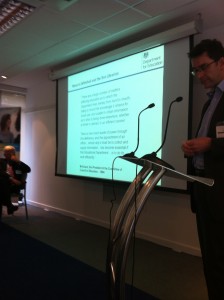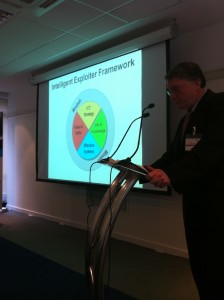Yesterday I was at a special invitation summit to discuss the future direction of the Chartered Institute of Library & Information Professionals. CILIP is undergoing a fairly dramatic repositioning under new CEO Annie Mauger and this was the first of a couple of attempts to broaden the debate with a wider constituency.
It was well organised (and run) by Martin White and Sandra Ward, two people whose names are synonymous with the words ‘Information’ and ‘management’, and whose best efforts had persuaded many thought leaders in the Information Management space to attend. Attendees were asked not to tweet and to follow The Chatham House Rule that states:
When a meeting, or part thereof, is held under the Chatham House Rule, participants are free to use the information received, but neither the identity nor the affiliation of the speaker(s), nor that of any other participant, may be revealed’
So (as a member of Chatham House and compelled to comply) here are my observations aided by a couple of pictures and slides published with the speakers permission.
10 observations:
‘Nothing has changed and yet everything is different’. Jean-Paul Sartre’s quote is apposite: 20 years on since my colleagues and I at Saudi International Bank were creating a one screen view of what we knew about a client (the forerunner of an intranet / CRM system) I suggest that despite all the gismos (technical advances) senior executives are still looking for reliable trustworthy information/intelligence – the synopsis they can trust, from people they trust. And don’t want to do self searching to find it. At the closing a wonderful story was told about a senior executive who has a team that provide abridged briefing notes and expected outcomes (in his native language) for every meeting.
People are still the important navigational hub and their knowledge networks vital. When they go their knowledge (and their networks) go with them. HM Government Knowledge & Information Strategy will make clear the importance of people and the public as the client and it will recognise that ‘who we know’ is as important as ‘what we know’ hence the investment in a Knowledge Harvesting Toolkit for KIM professionals (and training on Knowledge Capture & Retention).
We want measurements! Stories that amplify events and justification for Information and Knowledge team activity are hugely important but must be accompanied by statistics and measures which accounts in part for the increased call in the Public Sector for inventories of information and knowledge assets. In a world of data half a page of stats supported by a story is more powerful than two pages of prose.
We want certification! East, North and South of Istanbul there is a huge demand for education and certification. Competency management is king and certificates from accredited organisations a way of enhancing career prospects. West of Istanbul people (especially the young) are just happy to be in a job and employers are increasingly demanding new entrants to be more self aware.
Apps are the future, websites are the past: Perhaps driven by a healthy scepticism of advertising and brochure ware websites dynamic content is key. This is presenting a challenge to the information industry who need to be more proactive in saying ‘read this and here’s why’. Ask yourself when did you last go to a corporate website and believe what it said – buying decisions are being driven by recommendations of people (and organisations) YOU trust. And Apps are making the process smoother as mobile replaces pc’s and tablets, laptops.
Fear is driving (in)action / lack of collaboration: the financial services industry has taken a bashing and the regulators are all over them extolling the virtues of a change in culture and trying to audit whether they have. Chinese Walls are getting higher so no Yammer or Jive to cross fertilise ideas and clients and silos will get more pronounced. In the Public Sector the rise of the SIRO (Senior Information RIsk Officer) as a board member suggests a greater and more visible role is emerging where risk aversion becomes a major driver of decisions.
Organisations are becoming hermetically sealed bubbles virtually impenetrable to anyone who is not of the same size. It used to be accepted doctrine that ‘no one got fired for hiring IBM’, now the same applies with big consultancy firms. A vivid illustration was given: despite agreeing the scope of work with the client, being the best qualified and most experienced, formal sign off was not forthcoming for this internationally renowned consultant because ‘he is not …’ (three letters)!
Modular competency acquisition the way forward/ Facilitation key: Many of the speakers and delegates commented on the need to be good at getting others to work well and be opportunistic. A role where the KIM professional, briefs, analyses and introduces, new processes, systems and ways of working. The idea of a modular incremental approach to competency development was lauded, perhaps in conjunction with business schools and Universities. As was the new CILIP Professional Knowledge and Skills Base, that the UK Government’s Head of KIM has been a strong supporter of.
 KIM is here to stay: It was a common theme – KM especially is back (even if there is still ambiguity over what it is – especially in the North West). This from John Quinn is lovely, a quote from a report in 1894 on the Department for Education’s use of knowledge:
KIM is here to stay: It was a common theme – KM especially is back (even if there is still ambiguity over what it is – especially in the North West). This from John Quinn is lovely, a quote from a report in 1894 on the Department for Education’s use of knowledge:
…failing to record the knowledge it obtains for future use and unable to obtain information as to what is being done elsewhere either at home or abroad…’
To finish, a quote, from award winning Clive Holtham celebrating 25 years as one of the few to hold a Professor of Information Management title, ‘technology brings no competitive advantage’ – its an essential underpinning (my addition). Here’s Clive and his Intelligent Exploiter Framework – note the importance of ‘Mindset’.
And finally
Check out Full Fact a non profit making group that specialises in independent fact checking. Despite a bit of a spat with UK Column a year back it has become a must go to site to check the veracitiy of ‘facts’ and ‘stats’ that appear in the media and emanate from the mouths of our politicians. Will Moy’s BBC Question Time piece ‘Will you point out when panellists are lying?’ is worth a read and his stories given a hearing.


Paul.
Members of Chatham House should say only “The Chatham House Rule” (singular). V. good report otherwise.
Clive noted and amended, Thank you for pointing it out and for your kind words.